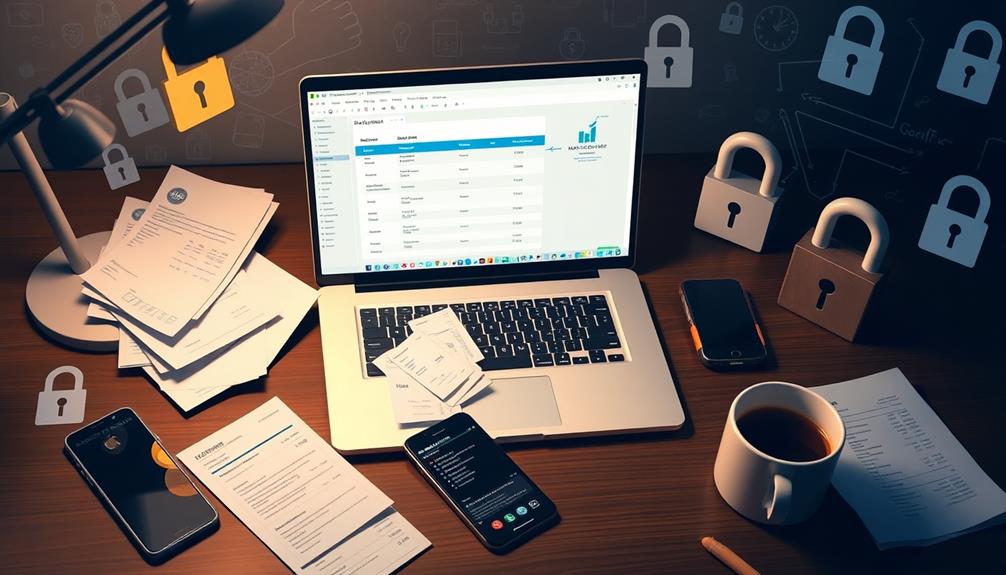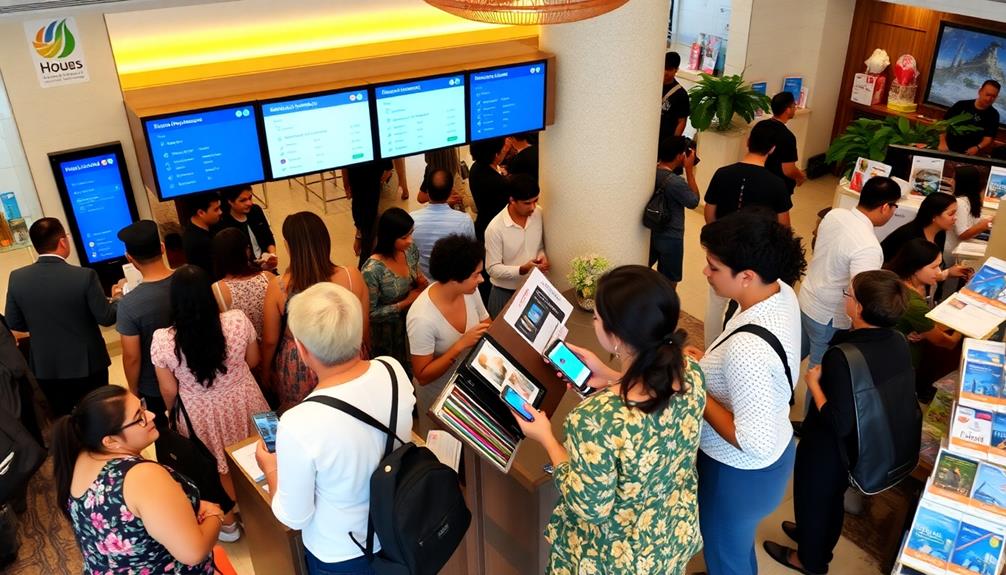As a freelancer or gig economy worker, picking the right payment solution is essential for your cash flow and professionalism. You can choose from peer-to-peer services like Venmo for quick access, but be mindful of their fees and lack of support. Hybrid services like PayPal simplify transactions but may complicate your finances. Dedicated merchant accounts provide tailored solutions with better service. Consider options like ACH payments for lower fees, or digital wallets for easy organization. Understanding your choices can improve client relationships and boost your income. There's more to explore about optimizing your payment processes.
Key Takeaways
- Freelancers should consider dedicated merchant accounts for tailored fee structures and professional customer support, enhancing credibility and cash flow.
- Peer-to-peer services offer quick payments but may have higher fees and lack customer support, making them less professional for freelancers.
- Hybrid payment solutions like PayPal combine personal and business transactions but can complicate finances with tricky fee structures.
- Instant payout features are preferred by 80% of gig workers, providing immediate access to funds and reducing overall transaction costs.
- Understanding the unique risks of freelance payment processing is crucial for selecting suitable solutions to minimize fees and account freezes.
Understanding Payment Processing

When it comes to payment processing for freelancers, understanding your options is vital for maintaining smooth cash flow and a professional image.
As a freelance worker, you've got various payment solutions at your disposal, each with its own pros and cons. Utilizing a dedicated merchant account can greatly enhance your credibility and streamline your payment processes, allowing for quicker transaction settlements.
Peer-to-peer (P2P) services like Cash App and Venmo might seem convenient, but they often come with higher fees and longer transaction times, not to mention a potential unprofessional image to your clients.
On the other hand, hybrid payment solutions like PayPal can blend personal and business functions, yet they often complicate your finances with tricky fee structures and the risk of account freezes.
Aggregate processors such as Square and Stripe offer quick access for new freelancers, but they can also pool risk, leading to potential account freezes and restricted access to your funds.
If you want to lower processing fees and improve customer service, consider establishing a dedicated merchant account through a merchant provider. This approach not only enhances your professionalism but also helps guarantee a more reliable income stream.
Understanding these payment processing options is essential for making informed decisions that support your freelance career.
Types of Payment Services

Freelancers have several types of payment services available, each catering to different needs and circumstances. Peer-to-peer payment services like Cash App, Venmo, and Zelle are popular for quick gig payments between individuals. However, they often charge fees for instant transfers and lack robust customer support, which can undermine professionalism.
Additionally, monitoring your payment options is essential for maintaining credit card insights and ensuring security.
Hybrid payment processing services such as PayPal combine personal and business transactions, but their high fees and complicated structures mightn't be ideal for freelancers.
Aggregate payment processors like Square and Stripe offer quick approval but come with shared merchant accounts, leading to higher fees and potential account freezes that restrict access to your funds.
For those looking to enhance their professional image, dedicated merchant accounts provide tailored fee structures and direct customer service. This setup helps you retain more of your earnings while maintaining professionalism.
Finally, if you're in a high-risk industry, specialized high-risk payment processing providers like ECS Payments can facilitate secure transactions, ensuring you get paid without hassles.
Choosing the right service is critical for effective payment processing in your freelance journey.
Payment Solutions for Gig Workers

For gig workers maneuvering the often-complicated landscape of payments, selecting the right payment solution can greatly influence their earnings and efficiency. Many gig workers rely on platform-specific payment solutions like those from Uber or DoorDash, but these typically come with fees that can eat into your earnings.
To maximize your income, consider alternative payment methods. Here's a quick comparison:
| Payment Solution | Pros |
|---|---|
| Platform-Specific | Convenience but higher fees |
| Direct Deposit | Cost-effective with lower fees |
| Personal Merchant Account | Attracts clients outside main platforms |
Additionally, using services like BILL can enable ACH payments, which avoid delays and often incur just 49 cents per transaction. Fast and flexible payment systems can enhance contractor retention, as a significant 80% of gig workers prefer platforms offering instant, fee-free payments. By choosing the right gig economy payment solution, you can boost your earnings and streamline your work process, allowing you to focus more on your gigs and less on the hassle of payment management.
High-Risk Payment Processing

If you're in a high-risk industry like coaching or mentoring, understanding your payment processing options is essential.
Exploring specialized merchant accounts that cater to your unique needs and risks can provide you with the flexibility required for your business.
Additionally, consider the benefits of tax-efficient growth through a Bitcoin IRA, as it can be a strategic move for maintaining financial stability.
Understanding High-Risk Classification
Steering through the world of high-risk payment processing can feel like walking a tightrope for many freelancers. If you're in industries like coaching or mentoring, you're likely classified as high-risk. This classification means your freelancer payment options are limited, as major platforms like Square, Stripe, and PayPal often prohibit processing for high-risk services.
Given the small mistakes, big impact involved in choosing the wrong payment solution, it's vital to carefully evaluate your options.
Understanding the implications of this classification is significant. High-risk freelancers often face higher fees and stricter regulations, which can eat into your profits if you're not prepared. You must recognize the risks associated with your specific offerings to choose the right payment solutions that protect you from potential financial losses.
Fortunately, specialized providers like ECS Payments cater to high-risk classifications, offering tailored merchant accounts that meet your unique needs. These options guarantee you can still access reliable payment processing, even when mainstream platforms fall short.
Specialized Merchant Account Options
Steering payment processing as a high-risk freelancer means exploring specialized merchant account options that cater specifically to your needs. In industries like coaching and mentoring, where fraud and chargebacks are common, securing a high-risk payment processing solution becomes vital.
Major platforms like Square, Stripe, and PayPal often prohibit such transactions, making specialized providers like ECS Payments essential for freelancers like you. By focusing on efficient payment solutions for your unique business model, you can better navigate the complexities of high-risk transactions.
When you opt for a high-risk merchant account, you can often enjoy lower processing fees, which helps enhance your profitability while managing the risks associated with your work. It's important to understand the nature of your freelance services, as this knowledge will guide you in selecting the most suitable payment processor that mitigates your risks effectively.
Additionally, specialized high-risk payment processors provide direct customer service access, ensuring quicker issue resolution and fostering a more professional image for your business.
Risk Management Strategies
Steering high-risk payment processing requires freelancers to adopt effective risk management strategies to safeguard their finances. If you're operating in industries prone to fraud or chargebacks, like coaching or consulting, you'll need to navigate the complexities of specialized payment solutions.
Traditional platforms often won't cut it, so consider providers like ECS Payments, which offer tailored high-risk merchant accounts. By exploring best websites to earn money online, you can discover various earning methods that may also help diversify your income streams.
Understanding the unique risks associated with your freelance services can help you select payment processing solutions that minimize potential losses. High-risk payment processing typically comes with increased fees and the possibility of account freezes, making it crucial to have a solid payment strategy in place.
To mitigate the challenges of high-risk payment processing, develop robust risk management strategies. Start with thorough client vetting to make sure you're working with reputable individuals or businesses.
Additionally, maintain transparent communication with your clients about payment terms and expectations. This proactive approach not only helps reduce the likelihood of disputes but also fosters trust.
Innovative Payment Options

When it comes to innovative payment options, you've got exciting choices like cryptocurrency solutions that offer security and speed, providing a modern approach to financial transactions.
Additionally, features like instant payouts can keep your cash flow steady, ensuring that you have access to your earnings when you need them most, especially in a landscape where affiliate marketing generates revenue through diverse partnerships.
Virtual wallets simplify managing your earnings in one place.
These advancements not only enhance your payment experience but also help you stay ahead in the gig economy.
Cryptocurrency Payment Solutions
As the gig economy continues to expand, many freelancers are turning to cryptocurrency payment solutions for their numerous advantages. Using cryptocurrency allows you to receive payments quickly, bypassing traditional banking intermediaries. This not only speeds up transactions but also reduces fees, making it an attractive option for your work.
However, it's important to remain aware of the security vulnerabilities that can arise with crypto wallets, as mismanagement can lead to lost funds. The adoption of cryptocurrency as a payment method is growing rapidly, with many gig economy payments now processed in digital currencies. This shift appeals to tech-savvy clients and freelancers who value innovation.
Additionally, cryptocurrency can offer increased security and privacy for your transactions. Since they're encrypted and pseudonymous, you can enjoy secure payments while lowering the risk of fraud compared to conventional methods.
Another benefit is the potential for increased earnings. If the value of the cryptocurrency you receive rises post-payment, you could see a boost in your income, unlike with fixed fiat currencies.
Furthermore, innovative platforms are emerging to facilitate these transactions, making it easier for you to manage earnings in multiple currencies and convert them to traditional currency whenever you want. Embracing cryptocurrency could be a game-changer for your freelancing career.
Instant Payout Features
Many freelancers are discovering the benefits of instant payout features that innovative payment options offer. With 80% of gig workers preferring services that provide immediate, fee-free payments, it's no wonder that platforms like PayQuicker are gaining popularity. They allow freelancers to access their earnings quickly, with support for over 210 countries and multiple currencies.
Implementing effective fraud prevention tools is essential for these platforms to guarantee secure transactions and protect users from potential threats. Solutions such as Branch make it even easier by enabling direct payments to digital banking accounts, eliminating overdraft fees and late payment charges. This promotes your financial wellness and peace of mind.
Additionally, ACH transactions through services like BILL streamline fund transfers directly to your account, reducing the hassles associated with traditional checks.
Companies that adopt these instant payout solutions also benefit financially. For instance, NexRep has saved $200K annually on payment processing fees by implementing these streamlined systems.
As a freelancer, you can enhance your cash flow and satisfaction by choosing platforms that prioritize instant payouts. This innovative approach not only improves your day-to-day financial management but also supports your overall success in the gig economy.
Virtual Wallet Advantages
A virtual wallet revolutionizes how freelancers manage their finances by centralizing all client transactions in one easy-to-navigate platform. This simplifies your financial oversight and organization, allowing you to focus more on your work.
With a Native Teams virtual wallet, you can receive direct fund deliveries from clients, streamlining the payment collection process and giving you better financial control. Additionally, leveraging a personal budget can help you allocate your earnings effectively, ensuring you meet both immediate needs and long-term savings goals.
The convenience of virtual wallets means you can easily withdraw funds to your dedicated payment card, facilitating immediate access to your earnings for both online and in-store purchases.
Plus, these wallets typically feature lower fees compared to traditional banking methods, which helps you retain more of your hard-earned income.
Security is another significant advantage; virtual wallets often include enhanced security measures like multi-factor authentication, ensuring your funds are protected against unauthorized access and fraud.
This peace of mind allows you to concentrate on your projects without worrying about the safety of your finances.
Features of Effective Payment Solutions

Finding the right payment solution can make or break your freelance experience. You need a system that minimizes costs while maximizing efficiency. Look for options with low transaction fees, like ACH payments through services such as BILL, which charge only 49 cents per transaction compared to higher fees from platforms like PayPal, which can be around 3%.
Personalized invoicing is another vital feature. You'll appreciate the flexibility of sending invoices without needing a legal entity, allowing you to manage your finances without the complexities of traditional business structures.
Centralized virtual wallets, like those offered by Native Teams, help you manage all your client transactions in one place. This simplifies financial organization and gives you quick access to your funds.
Fast and secure payment processing is essential, as 80% of gig workers prefer platforms that offer instant, fee-free payments. This not only enhances your satisfaction but also boosts client retention.
Lastly, make sure your payment solution provides thorough support and customer service. Quick resolution of issues helps maintain a professional image, leading to stronger relationships with your clients.
Choose wisely, and your freelance journey will be smoother.
Cost and Setup Considerations

When considering payment solutions, it's crucial to weigh the costs and setup requirements that come with each option. The cost of payment processing can vary widely; for instance, ACH payments through BILL charge only 49 cents per transaction, while PayPal may take up to 3% per transaction. This difference can greatly impact your earnings, so you'll want to choose wisely.
Setup considerations also play a critical role. Most payment processing platforms require personal details for verification, and the speed of account activation often hinges on the thoroughness of your information submission during KYC checks.
If you're looking for lower fees, dedicated merchant accounts might be the way to go, as they can provide tailored rates. On the other hand, aggregate processors like Square or Stripe generally have higher fees due to shared risk.
To minimize setup costs, consider platforms that offer flexible payment solutions without needing a legal entity. This approach streamlines onboarding and allows you to focus on your work.
Always evaluate your specific needs against the pricing structures and additional features to make an informed choice that aligns with your business model.
Building Client Relationships Through Payments

Choosing the right payment solution can considerably impact your ability to build strong client relationships. By offering multiple payment options, like direct bank transfers and digital wallets, you enhance client trust and satisfaction. A staggering 80% of gig workers prefer platforms with instant, fee-free payments.
Here's a quick look at how various payment systems can affect your client relationships:
| Payment System | Impact on Client Relationships |
|---|---|
| Direct Bank Transfers | High trust, instant access |
| Digital Wallets | Fast, fee-free transactions |
| Professional Invoicing | Establishes credibility |
| Transparent Fees | Reduces misunderstandings |
| Timely Payments | Boosts client loyalty |
Utilizing a professional invoicing system guarantees clarity in your financial transactions, making clients more likely to return for future work. Implementing transparent fee structures fosters clear communication, minimizing potential misunderstandings. Timely payments can enhance contractor retention by up to 80%, while personalized payment requests encourage professionalism. By prioritizing these aspects, you'll cultivate stronger client relationships, guaranteeing ongoing collaborations and mutual success.
Frequently Asked Questions
What Payment System Do Freelancers Use?
When considering what payment system to use, you'll find that many freelancers opt for quick options like peer-to-peer services, but professional choices, such as dedicated merchant accounts, can enhance your image and stability.
How Do Most Gig Workers Get Paid?
Think of gig workers as busy bees, buzzing from task to task. They usually get paid through quick platforms, like PayPal or direct deposits, ensuring they've instant access to their hard-earned money when needed.
What Is the Difference Between Gig Economy and Freelancing?
When you compare gig economy work to freelancing, you'll notice gig jobs are often short-term and task-based, while freelancing typically involves longer projects and client relationships, offering more stability and predictable income over time.
How Do Gig Economy Workers Deal With Paying Taxes?
Like a juggler balancing multiple balls, you manage your taxes by reporting all income, filing a Schedule C, and possibly hiring a tax pro. Don't forget those quarterly estimated payments to avoid penalties!
Conclusion
In the ever-evolving world of freelancing, steering through payment solutions can be intimidating yet rewarding. While traditional methods may offer familiarity, innovative options promise speed and flexibility. Embracing these diverse payment services not only streamlines your transactions but also strengthens your relationships with clients. As you balance the risks and costs, remember that the right solution can elevate your work experience, transforming challenges into opportunities for growth and success in the gig economy.











